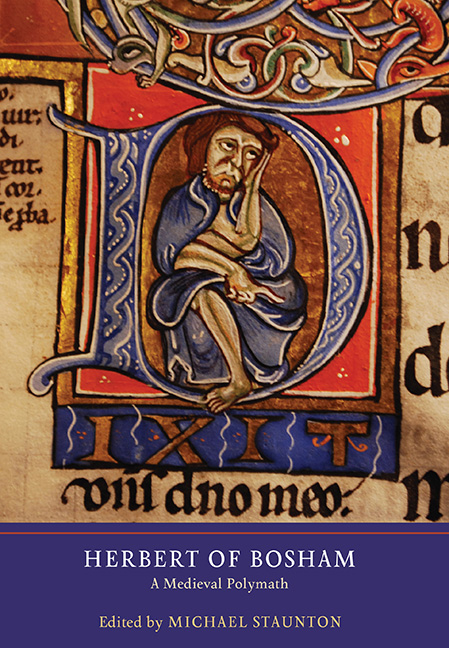Book contents
- Frontmatter
- Contents
- List of Illustrations
- List of Contributors
- Editorial Preface
- List of Abbreviations
- 1 An Introduction to Herbert of Bosham
- 2 Master Herbert: Becket's eruditus, Envoy, Adviser, and Ghost-writer?
- 3 Herbert of Bosham and Peter Lombard
- 4 Pages Covered with as Many Tears as Notes: Herbert of Bosham and the Glossed Manuscripts for Thomas Becket
- 5 Scholarship as a Weapon: Herbert of Bosham's Letter Collection
- 6 Time, Change and History in Herbert of Bosham's Historia
- 7 John Allen Giles and Herbert of Bosham: The Criminous Clerk as Editor
- 8 The Missing Leaves of Arras MS 649: A Tale of Lost and Found
- 9 Encounters with Herbert of Bosham
- Appendix: A New Letter of Herbert of Bosham (1175 x 1178)
- Select Bibliography
- Index
6 - Time, Change and History in Herbert of Bosham's Historia
Published online by Cambridge University Press: 26 March 2019
- Frontmatter
- Contents
- List of Illustrations
- List of Contributors
- Editorial Preface
- List of Abbreviations
- 1 An Introduction to Herbert of Bosham
- 2 Master Herbert: Becket's eruditus, Envoy, Adviser, and Ghost-writer?
- 3 Herbert of Bosham and Peter Lombard
- 4 Pages Covered with as Many Tears as Notes: Herbert of Bosham and the Glossed Manuscripts for Thomas Becket
- 5 Scholarship as a Weapon: Herbert of Bosham's Letter Collection
- 6 Time, Change and History in Herbert of Bosham's Historia
- 7 John Allen Giles and Herbert of Bosham: The Criminous Clerk as Editor
- 8 The Missing Leaves of Arras MS 649: A Tale of Lost and Found
- 9 Encounters with Herbert of Bosham
- Appendix: A New Letter of Herbert of Bosham (1175 x 1178)
- Select Bibliography
- Index
Summary
HERBERT of Bosham's account of Thomas Becket's life is usually called the Vita Sancti Thomae, and discussed in terms of the hagiography of the saint, but there are reasons we should think of it more in terms of history. Herbert's own preferred term for his work was the Historia, and he makes regular reference to it as such, in the work itself and elsewhere. He justifies his approach to those who might consider it too theological and insufficiently ‘historical’, and denies that he is going beyond the ‘law of history’, insisting that his work is quite in conformity with it. And in the last lines of the book Herbert addresses Thomas and calls himself ‘your historian’ (historiographus tuus). Of course, just because Herbert calls it so does not make it a history: he also calls it ‘this little history book’ (libellus historicus hic), and this work of around 80,000 words in length is far from a libellus. But the fact that Herbert so regularly uses the term historia with reference to his work suggests that we should consider it in terms of history, and see what a specifically historical perspective on it can reveal.
To consider Herbert's work as history does not mean that it cannot also be considered as hagiography. The distinction was not as rigid in the twelfth century as modern conventions might imply: histories could include hagiography, and saints’ Lives could have features such as documentary evidence that we tend to associate with contemporary historical writing. Herbert offers us a narrative of a man celebrated by its author and by the universal church as a saint, but there are indications from the start that we are about to see something different to the other Lives of St Thomas. Though he includes a number of prophetic visions, he excludes miracles. Herbert frequently proposes to pontiffs that they follow Thomas's example, describing him as an ‘exemplary man’ (vir exemplaris), but he determines to present Thomas as an exemplar to be imitated in works, rather than marvelled at in the signs ‘given for unbelievers’ (propter infideles data). And although he shows some interest in pilgrimage to Thomas's tomb, prophesies fulfilled, visions of the saint, parallels with Christ, and the ‘miraculous’ penance of the murderers and the king, he discusses these in a separate work, the Liber melorum.
- Type
- Chapter
- Information
- Herbert of BoshamA Medieval Polymath, pp. 104 - 126Publisher: Boydell & BrewerPrint publication year: 2019
- 1
- Cited by



